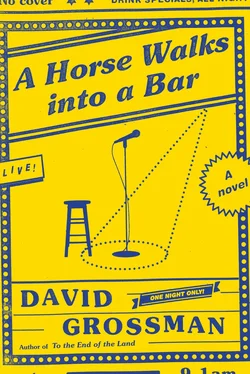“Not funny? Oh, I see. Sophisticated audience, you guys are, with European standards. Okay, no problem, we’ll come at it another way, which I think might be more up your alley. Here’s a little psychological analysis plus emotional insight. Me, when I was a kid, I had the most accurate scientific gauge for knowing who was popular and who wasn’t. I call it the Shoelace Gauge. Let me explain. Let’s say a group of kids is walking home from school. Walking, talking, yakking, yelling. You know—kids. One of them crouches down to tie his shoelace. Now, if the group stops right away—but I mean every single one of them, even kids who were looking the other way and didn’t see him crouch down—if they all stop where they are and wait for him, then he’s in, he’s good, he’s popular. But if no one even notices him, and only sometime toward the end of senior year, like at graduation, someone goes, ‘Hey, anyone know what happened to that dude who stopped to tie his shoelace?’ Well, then you know that that dude—he’s me.”
The little woman is perched on the edge of her seat, mouth open slightly, feet pressed tightly together. He gives her a glance while he takes a sip from his flask, then looks into my eyes, a long, deep look. For the first time since he started telling the story, he looks straight at me, and I have a peculiar sense that he’s taken an ember from the woman and passed it to me.
“Long story short, I follow the soldier girl, and I get it into my head that either they’re going to punish me for something I did—but what could I have done? Me? The biggest klutz in the class, the biggest dork, the biggest sucker? A good boy …” He winks at the little woman and immediately looks for me. “Wait a minute, Judge, is that even a word anymore? Is that still on the market, ‘sucker’? It’s not a collector’s item?”
There is no hostility in his voice or in his eyes, which confuses me. I confirm that the word is still in currency. He repeats it to himself quietly several times, and I get sucked into whispering it along with him.
“Either that, or it’s something to do with my father. He got some bee in his bonnet, maybe decided something about this whole Gadna doesn’t sit right with him, it’s an affront to his dignity, or maybe he found out that Gadna has something to do with the Labor Party, and he’s a Beitar guy, or, most likely of all, he found the dirty magazines I hid behind the window blinds in my room and he’s summoned me for consultations. Could be anything. With him, you never really knew where the next punch was going to come from.”
He stands at the edge of the stage, very close to the front row of tables, and shoves his hands into his armpits. Some of the people look up at him. Others sink into themselves with an odd, feeble gaze, as though they’ve given up following him and yet cannot look away.
“And then I realize she’s talking to me, the sergeant. She’s walking quickly and saying I have to go home right now, there’s no time, I have to get to the funeral by four. She doesn’t turn her head back to me, like, I don’t know, she’s afraid to look at me, and don’t forget that all this time right in front of my eyes is her ass, which is quite the sight. Truth is, asses are generally a stimulating topic. You tell me, guys, hands to your hearts—I said to hearts, table thirteen! Between you and me, have you ever seen a woman who is satisfied with her ass? Even one single woman under the sun?”
He keeps talking. I see his lips move. He waves his hands, he grins. A white, milky fog begins to spread through my head.
“You know that thing where she stands in front of the mirror and looks back from this side, then from the other side—and by the way, when they’re talking about their own personal asses, women can rotate their heads three hundred sixty-five degrees, no problem, guaranteed! It’s scientific! It’s a rotation that only two other organisms in all of nature can perform: sunflowers and crankshafts. And then she turns around like this—”
He demonstrates, almost slipping backward onto the tables. I look around. I see lots of holes. Little sinkholes opening wide to laugh.
“She looks…she checks…And don’t forget she has this app in her head, Google Ass, which at any given moment compares her ass to the size it was when she was seventeen. And very gradually she gets this face, and it’s the face she only has in this one particular circumstance, in Latin it’s called an endemic face, or in English: ass-face. And then, like a queen in a Greek tragedy, she pronounces: ‘That’s it. It’s starting to fall.’ No! It’s worse! It’s dropping. You get that? She starts to sound like her ass’s social worker! Like the ass, of its own free will and with premeditated intention, is dropping out, retreating from society, turning its back on civilization, turning into a fringe ass. Any second now you’ll find it shooting up in the alleyway. And you, my fellow males, if you happen to be with her in the room at this particular moment, your best course of action is to zip it. Don’t say a word! Anything you say can and will be used against you. If you tell her she’s exaggerating, that it’s actually cute and attractive and pinchable and strokeable—you’re done for: you’re blind, you’re a flatterer, you’re an idiot, you don’t know the first thing about women. On the other hand, if you tell her she’s right—you’re a dead man.”
He pants. The bit is over. Who knows how many times he’s done it before. His voice no longer fills out every word—some of the syllables he swallows. The crowd laughs. I still hope I misheard, that I missed something, that there was a joke that got past me. But when I look at the little medium, her face twisted in pain, I know.
“Where were we? You’re such a lovely audience! Honestly, I’d like to take you home with me. Okay, so the ass is walking ahead of me, she’s in front and I’m in back, I have no clue what she wants from me, what all that babbling about a funeral was, and I’ve never even been to a funeral, haven’t had the opportunity, I come from a small family, as you know, we’ve covered that, mom and dad and kid, and we never had funerals, there weren’t any relatives left to die—it was just him and her. Wait, that reminds me of something. Since we’re on the topic of relatives, I read in the paper this week that scientists discovered that the closest creature to human beings, genetically, is some kind of blind worm that’s totally primitive. I swear! This worm and us, we’re like this! But I’m starting to think we might be the black sheep of the family, because, otherwise, explain to me why they never invite us to their parties?” He throws another left hook in the air. There is a heavy silence in the room. I believe what he said before is starting to sink in.
“Okay, I get it, I see. Recalculating route. Where were we? Mom-dad-kid. No family. No relatives. We said that. Quiet and calm like the Bermuda Triangle. Yeah, there were a few things here and there, not that you really give that stuff any thought at that age, but I did have some awareness that my father was no spring chicken, and that actually he was the oldest of all the class dads, and I knew he had blood sugar, and heart, and kidneys, and he took pills, and I also knew, well, actually I could see, everyone could see, that his blood pressure was so high he was in a constant state of…I don’t know…Archie Bunker bickering with Edith. And Mom, too, even though she was much younger than him, she had all kinds of baggage from there that she carried around. I mean, she spent almost six months shut up in this tiny little compartment in a train car, like a closet for storing paint and grease where you couldn’t even stand or sit, it was good times, and apart from all that she also had on her wrist, on both wrists”—he holds his thin forearms up—“these delicate little stitches, the finest vein embroidery, which the top-rated needleworkers gave her at Bikur Holim Hospital. It’s interesting, actually, that we both had postpartum depression after I was born, except that with me it’s been going on for fifty-seven years. But apart from those little issues, which I’m sure every normal family has, the three of us were pretty much fine, and so what was this business about a funeral?”
Читать дальше












